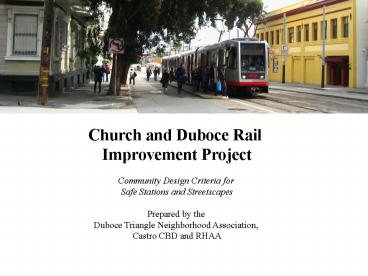Church and Duboce Rail Improvement Project PowerPoint PPT Presentation
1 / 23
Title: Church and Duboce Rail Improvement Project
1
Church and Duboce Rail Improvement
Project Community Design Criteria for Safe
Stations and Streetscapes Prepared by the
Duboce Triangle Neighborhood Association,
Castro CBD and RHAA
2
Background Duboce Triangle neighborhood and
Castro CBD has been working collaboratively with
the MTA for a year and a half to integrate the
communitys vision into MTAs re-railing plan
for Church Duboce Sts.
3
- Project Timeline
- MTA presentation to the Duboce Triangle
Neighborhood Association, call for collaboration.
(November 2008) - Baseline pedestrian counts at five locations in
the study area. (Early 2008) - Place audit results using the Project for
Public Spaces methodology at five locations in
the study area. (Early 2008) - Castro CBD Upper Market Streetscape design plan.
(Early 2008) - MTA, DTNA and Castro CBD begin meeting monthly.
(Early 2008) - Initial joint DTNA and CBD conceptual plan for
the project area based on place audit results and
Streetscape plan. (March 2008) - Packed community workshop (MTA in attendance) on
communitys conceptual plan. (May 2008) - Updated recommendations of conceptual plan. (May
2008) - Holistic budget (iterative process) for project
including community elements vetted and approved
by the MTA on technical merits. (Fall/Winter
2008) - MTA presentation to DTNA members on progress.
(Fall 2008) - MTA CER released (March 2009)
- MTA project manager replacement (March 2009)
- Detailed design recommendations for study area
based (March/April 2009 and ongoing)
4
The Opportunity Once-in-a-generation chance to
rebuild a majorneighborhood transfer corridor
into a people-first transit hub that improves
service and strengthens ridership.
5
Overall Area Plan
6
Community Design Objectives
- Establish safe boarding areas with strong
connections to surrounding sidewalks and
pedestrian zones - Unify streetscape to create a neighborhood
transit hub - Provide a visually clear and robust hardscape as
framework for future community design improvements
7
Community Design Objectives
- Create multi-function neighborhood places
within sidewalk and street ROW that support
social life and human comfort - Integrate engineering and urban design best
practices - Minimize visual clutter, noise and vibration
8
Boarding Island Design Criteria
- Assumptions
- Boarding areas (incl. lanes) function as a
shared space - Pedestrians cross travel lane regardless of
barriers - Safest conditions are created by eye contact and
slow speeds - Paving and hardscape provide strongest visual
signals for wayfinding and right-of-way - Comfort, space and safety are primary rider needs
when waiting
9
(No Transcript)
10
(No Transcript)
11
(No Transcript)
12
(No Transcript)
13
Key Design Components
SAFETY All features working together! Success
depends on integration of designwithout all
components, effectiveness is compromised.
- Raised travel lane (flush crossing condition)
- Large bollards defining travel lane and island
areas - Visually bold paving pattern spanning sidewalk,
travel lane and boarding island - Detectable warning strip at bollard interface
zone - Signage indicating right-of-way and yield
- Columnar trees to define spaces and slow traffic
14
Design Precedents Flush travel lane and sidewalk
San Francisco, CA Hayes Green
Boulder, CO Flush Bike Way
15
Design Precedents Seating bollards
San Francisco, CA Duboce Triangle
16
Design Precedents Special paving in trackway
and boarding island
Sacramento, CA Light Rail
Sacramento, CA Light Rail
San Francisco, CA Light Rail
Portland, OR Light Rail
San Jose, CA Light Rail
17
Design Precedents Detectable Warning Strip
Sacramento, CA Light Rail
San Francisco, CA Hayes Green
18
Design Precedents Signage
Portland, CA Light Rail
San Francisco, CA Embarcadero
19
Design Precedents Trees in boarding island
San Jose, CA VTA Light Rail
Portland, Oregon MAX Light Rail
San Jose VTA Light Rail
20
(No Transcript)
21
(No Transcript)
22
(No Transcript)
23
(No Transcript)

